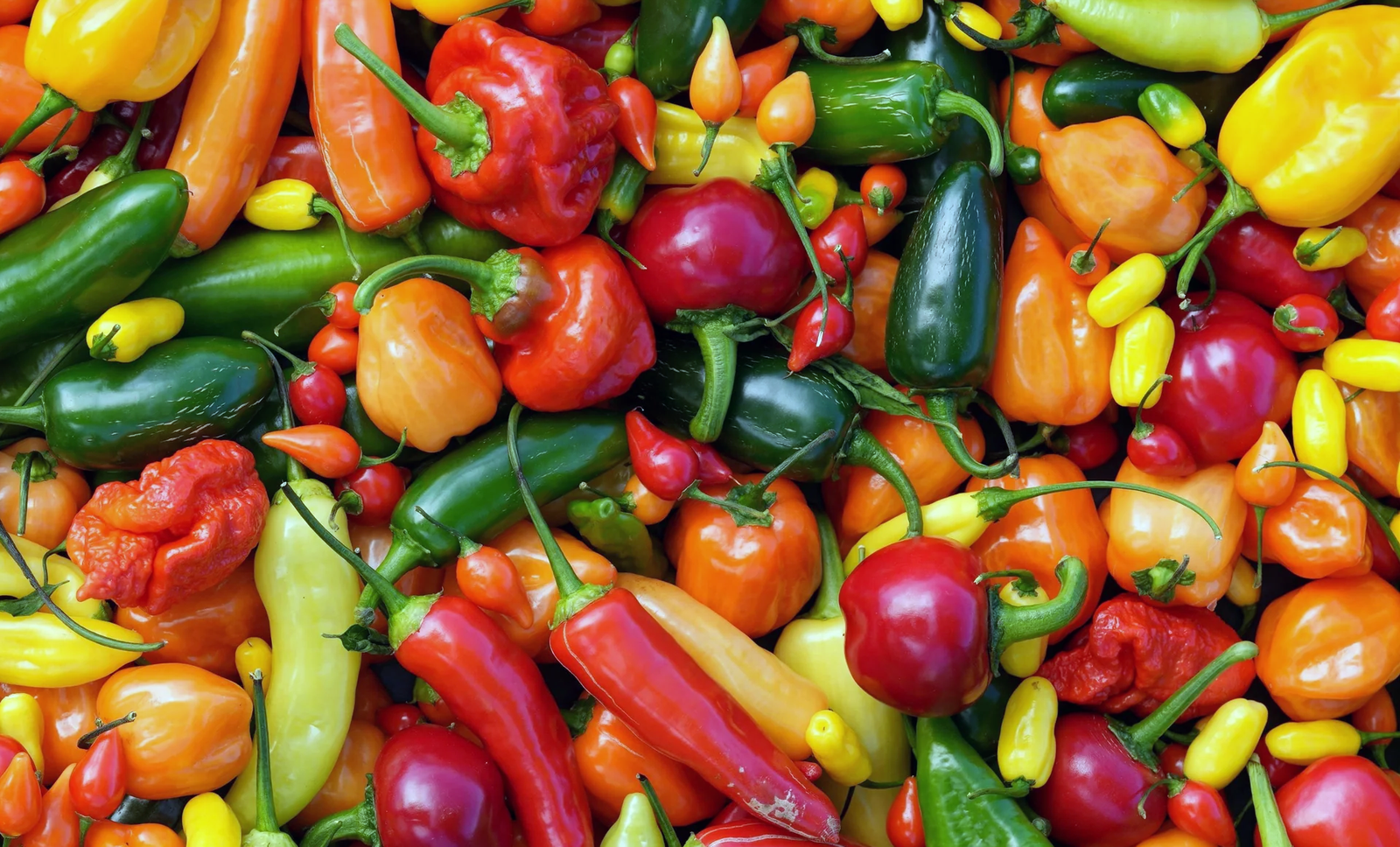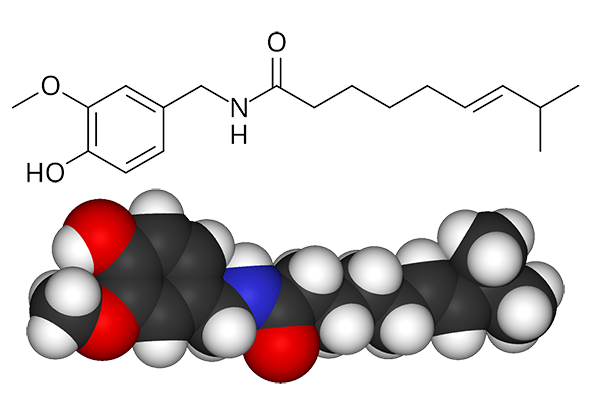FabulousFusionFood's Chilli-based Recipes 9th Page
 A mixture of different chilli peppers.
A mixture of different chilli peppers.
Welcome to FabulousFusionFood's Chilli-based Recipes Page — The recipes presented here all contain chilli peppers as a main ingredient. Chillies are the fruit of the chilli plant. Along with black pepper, they are unique spices in that they impart 'heat' to a dish without any associated bitterness. The dried and powdered fruit along with the fresh fruit and the dried fruit are all used as spices. As well as their capsaicin induced heat, chillies (depending on the variety or cultivar) can also imbue a dish with a fruity flavour. Smoked chillies are also used to impart a smokiness as well as heat to a dish.
Chilli peppers, also spelled chile or chili (from Classical Nahuatl chīlli [ˈt͡ʃiːlːi]) and known as hot peppers, are varieties of berry-fruit plants from the genus Capsicum, which are members of the nightshade family Solanaceae, cultivated for their pungency. Chilli peppers are widely used in many cuisines as a spice to add "heat" to dishes. Capsaicin and the related capsaicinoids give chillies their intensity when ingested or applied topically. Chilli peppers exhibit a range of heat and flavours. This diversity is the reason behind the availability of different types of chilli powder, each offering its own taste and heat level.
Chilli peppers originated in Central or South America and were first cultivated in Mexico. European explorers brought chillies back to the Old World in the late 16th century as part of the Columbian Exchange, which led to the cultivation of multiple varieties across the world for food and traditional medicine. Five Capsicum species have been widely cultivated: annuum, baccatum, chinense, frutescens, and pubescens.
 The capsaicin molecule, chemical structure (top) and space-filling model (bottom).
The capsaicin molecule, chemical structure (top) and space-filling model (bottom).
When peppers are consumed by mammals such as humans, capsaicin binds with pain receptors in the mouth and throat, potentially evoking pain via spinal relays to the brainstem and thalamus where heat and discomfort are perceived. However, birds are unable to perceive the hotness and so they can eat some of the hottest peppers. The intensity of the "heat" of chillies is commonly reported in Scoville heat units (SHU), invented by American pharmacist Wilbur Scoville in 1912. Historically, it was a measure of the dilution of an amount of chilli extract added to sugar syrup before its heat becomes undetectable to a panel of tasters; the more it has to be diluted to be undetectable, the more powerful the variety, and therefore the higher the rating. Since the 1980s, spice heat has been assessed quantitatively by high-performance liquid chromatography (HPLC), which measures the concentration of heat-producing capsaicinoids, typically with capsaicin content as the main measure
The alphabetical list of all the chilli-based on this site follows, (limited to 100 recipes per page). There are 1756 recipes in total:
Page 9 of 18
| Kewa Phagsha (Spicy Pork with Potatoes) Origin: Bhutan | Koro Owu Soup (Cotton Seed Soup) Origin: Nigeria | Laza Hot Sauce Origin: Turkey |
| Khanom Jeen Nam Ya (Khanom Jeen Noodles) Origin: Thailand | Koshari (Egyptian lentils) Origin: Egypt | Le Koki (Bean Cake) Origin: Chad |
| Khanom Jeen Nam Ya (Khanom Jeen Noodles) Origin: Thailand | Kotor Bay Stewed Fish Origin: Montenegro | Le Koki de Cameroun (Cameroonian Bean Cake) Origin: Cameroon |
| Kharcho (Georgian Beef and Rice Soup) Origin: Georgia | Kouti (Cassava Croquettes) Origin: Guinea | Le Ndolé Camerounais (Cameroonian Ndolé) Origin: Cameroon |
| Khatmitthi Raani (Tamarind Chutney) Origin: India | Kpakpo Shito (Fresh Shitor) Origin: Ghana | Le Rougail Boucané (Smoked Pork Rougail) Origin: Reunion |
| Khatta Curry Origin: India | Krain Krain (Jute Leaf Stew) Origin: Sierra Leone | Leftover Roast Beef Jalfrezi Origin: Anglo-Indian |
| Khatta Meetha (Cabbage Curry) Origin: India | Kuah Kuning (Yellow Gravy Soup) Origin: Papua | Leftovers Jalfrezi with Gravy Origin: India |
| Khichiri Prawn Sauce Origin: India | Kuchela Origin: Trinidad | Leksour (Lamb Stew on Millet Pancakes) Origin: Mauritania |
| Khnom Jin Namya (Catfish Curry over Noodles) Origin: Thailand | Kuka Soup Origin: Nigeria | Lemon Chilli Chicken Origin: Cocos Islands |
| Khowsuey Origin: Chile | Kurmanash Origin: India | Lemongrass Curry Origin: Cambodia |
| Kibeba (Cassava and Cuttlefish Stew) Origin: Mozambique | Kyinkyinga (Beef and Liver Kebabs) Origin: Ghana | Lemongrass Pork with Rice Noodles Origin: Australia |
| Kibeba de Angola Origin: Angola | La Capitaine Sangha (Nile Perch with Red Sauce) Origin: Mali | Lentil Curry with Rhubarb and Sweet Potatoes Origin: Fusion |
| Kilishi (Dried Sliced Beef) Origin: Nigeria | Laal Chicken Curry Origin: Britain | Lentil Or Potato Tempering Origin: India |
| Kima (Chopped Beef and Chilli Fry) Origin: Senegal | Laal Maas (Rajasthani Lamb Curry) Origin: India | Les Bouchons (Pork Dumplings) Origin: Reunion |
| Kimchi Origin: Korea | Laap (Beef Salad) Origin: Laos | Lesothan Chakalaka Origin: Lesotho |
| Kiseli Kupus Origin: Croatia | Lablabi Origin: Tunisia | Liberian Jollof Rice Origin: Liberia |
| Kissuto Rombo (Baked Kid Goat) Origin: Sao Tome | Lahmacun (Turkish Cypriot-style Pizza) Origin: Northern Cyprus | Liberian Jollof Rice Origin: Liberia |
| Kjufteta Po Cirpanski (Meatballs and Potatoes) Origin: Bulgaria | Laj Ntses (Fish Larb) Origin: Laos | Liberian Pepper Kala Origin: Liberia |
| Kobi Bhaji Origin: India | Laksa Paste Origin: Singapore | Liberian Pepper Sauce Origin: Liberia |
| Kobi Keema (Cabbage and Minced Meat Curry) Origin: India | Laksa Paste Origin: Malaysia | Liberian Split Peas Origin: Liberia |
| Kobi Sabji (Cabbage Sabji) Origin: India | Laksa Paste II Origin: Malaysia | Liberian-style Fried Cabbage Origin: Liberia |
| Kofta Curry (Meatball Curry) Origin: Pakistan | Lamb Dhan Saag Origin: India | Lightly-brined Turkey Origin: Britain |
| Koki Origin: Cameroon | Lamb Jalfrezi Origin: India | Lobsgows Gorllewin Affrica (West African Lobscouse) Origin: Welsh |
| Kokoda (Oceanian Ceviche) Origin: Fiji | Lamb Koftas Origin: North Africa | Locro de Zapallo Origin: Peru |
| Kokoda (Fijian Ceviche) Origin: Fiji | Lamb Rogan Josh Origin: India | Logosta Assada (Roasted Lobster) Origin: Guinea-Bissau |
| Kokoda (Oceanian Ceviche) Origin: Papua New Guinea | Lao Tam Som (Lao Green Papaya Salad) Origin: Laos | Lonumiru Curry Powder Origin: Maldives |
| Kokoda (Oceanian Ceviche) Origin: Solomon Islands | Lasary Citron (Lemon Condiment) Origin: Reunion | Lonumirus (Maldives Chilli Sambal) Origin: Maldives |
| Kokum Kari (Kokam Curry) Origin: India | Lasary Manga (Mango Condiment) Origin: Madagascar | Lourenço Marques Prawns Origin: South Africa |
| Komprek Eromba (Water Dropwort Eromba) Origin: India | Lauki Raita (Bottle Gourd Raita) Origin: India | Lowumbo (Ugandan Steamed Fish) Origin: Uganda |
| Kondré de Porc (Kondré of Pork) Origin: Cameroon | Laza Hot Sauce Origin: Kyrgyzstan | Luk Marinovannyi Origin: Georgia |
| Konkoé Turé Gbéli (Smoked Catfish Stew with Vegetables) Origin: Guinea | Laza Hot Sauce Origin: China | M'hajeb (Filled Pastries) Origin: Algeria |
| Kontomire Stew (Cocoyam Leaf Stew) Origin: Ghana | Laza Hot Sauce Origin: Uzbekistan | M'borokhé (Peanut Sauce with Spinach) Origin: Mali |
| Korean-flavoured Lamb Shanks with Swede and Potato Mash Origin: Fusion | Laza Hot Sauce Origin: Kazakhstan | |
| Korma Masala Origin: India | Laza Hot Sauce Origin: Russia |
Page 9 of 18